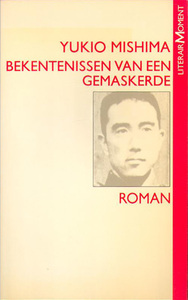You need to sign in or sign up before continuing.
Take a photo of a barcode or cover
I have a lot of conflicting thoughts around this book that I may decided to come and write down later. But for now, this is what I've got.
Confessions of a Mask is Mishima's second novel, published when he was 24. Being the same age as Mishima when he wrote this book was a surreal experience in and of itself, but it also made me more sympathetic to the flaws I found with the book. Confessions of a Mask is a semi-autobiographical story of Mishima's life up until that point told from the point of view of the protagonist, Kocchan. It's filled with self-hatred, internalized homophobia, and Kocchan's persistent obsession with death.
The structure of this book was... interesting. Some of it, I'm sure, can be blamed on the translator as some of the sentences come off as wordy and needlessly convoluted. But, Mishima deserves some of the credit. He often takes wild tangents into Roman history and Greek thinking which left me feeling confused about it's overall purpose. This is where I had to remember that not only is this only his second book, he was also a college student. He was my age. And as someone prone to rambling uselessly, who am I to judge, really.
Overall, I really enjoyed the look into Japan before, during, and after WWII and I enjoyed the internal struggle Kocchan was dealing with throughout the novel that seems almost inconsequential when you take into effect the constant threat of air raids. Mishima was a trailblazer for queer writing even if he never himself identified with the label, and even complicated stories like this are important to have.
Confessions of a Mask is Mishima's second novel, published when he was 24. Being the same age as Mishima when he wrote this book was a surreal experience in and of itself, but it also made me more sympathetic to the flaws I found with the book. Confessions of a Mask is a semi-autobiographical story of Mishima's life up until that point told from the point of view of the protagonist, Kocchan. It's filled with self-hatred, internalized homophobia, and Kocchan's persistent obsession with death.
The structure of this book was... interesting. Some of it, I'm sure, can be blamed on the translator as some of the sentences come off as wordy and needlessly convoluted. But, Mishima deserves some of the credit. He often takes wild tangents into Roman history and Greek thinking which left me feeling confused about it's overall purpose. This is where I had to remember that not only is this only his second book, he was also a college student. He was my age. And as someone prone to rambling uselessly, who am I to judge, really.
Overall, I really enjoyed the look into Japan before, during, and after WWII and I enjoyed the internal struggle Kocchan was dealing with throughout the novel that seems almost inconsequential when you take into effect the constant threat of air raids. Mishima was a trailblazer for queer writing even if he never himself identified with the label, and even complicated stories like this are important to have.
dark
emotional
reflective
sad
medium-paced
Quizás fueron mis expectativas demasiado altas, por aquello, creo que mi calificación real debería ser un 2,5 y no un 2 a secas.
La forma de narrar del autor es bastante cautivadora, me agradó y no me despegó de sus líneas, incluso cuando creí no sentir realmente una atracción por la trama. La verdad es que yo seguía esperando que sucediese algo, un clímax, un algo, que nunca sucedió; como verán, fueron expectativas mías las que no me permitieron conectar(me) sinceramente con el libro.
La forma de narrar del autor es bastante cautivadora, me agradó y no me despegó de sus líneas, incluso cuando creí no sentir realmente una atracción por la trama. La verdad es que yo seguía esperando que sucediese algo, un clímax, un algo, que nunca sucedió; como verán, fueron expectativas mías las que no me permitieron conectar(me) sinceramente con el libro.
"Alle rundt meg er homofobe"
Å, det er ikke bra.
"Jeg er besatt av tanken på vakre døde tenåringer døgnet rundt"
Å, det er heller ikke bra.
Å, det er ikke bra.
"Jeg er besatt av tanken på vakre døde tenåringer døgnet rundt"
Å, det er heller ikke bra.
challenging
dark
emotional
inspiring
reflective
relaxing
sad
slow-paced
Plot or Character Driven:
Character
Strong character development:
Complicated
Loveable characters:
Complicated
Diverse cast of characters:
Complicated
Flaws of characters a main focus:
Yes
this man manages to be a more pathetic gay pervert than me
Graphic: Sexual violence
Moderate: Body horror, Torture, Violence, Blood, War
Minor: Chronic illness, Cannibalism
emotional
relaxing
medium-paced
Plot or Character Driven:
Character
Strong character development:
Yes
Loveable characters:
Yes
Diverse cast of characters:
N/A
Flaws of characters a main focus:
Complicated
challenging
dark
emotional
hopeful
inspiring
reflective
sad
tense
medium-paced
Plot or Character Driven:
Character
Strong character development:
Yes
Loveable characters:
Complicated
Diverse cast of characters:
Yes
Flaws of characters a main focus:
Yes
emotional
reflective
sad
tense
medium-paced
Plot or Character Driven:
Character
Strong character development:
No
Loveable characters:
No
Diverse cast of characters:
No
Flaws of characters a main focus:
Yes
Simply written but poignant in the way that it seems like all of Mishima's writing is. Its amazing how well he captures the narcissism of youth and the specific kinds of intellectual barriers people will invent in order to avoid fully understanding themselves.
dark
emotional
hopeful
mysterious
reflective
sad
medium-paced
Plot or Character Driven:
Character
Strong character development:
Yes
Loveable characters:
Yes
Diverse cast of characters:
Yes
Flaws of characters a main focus:
Yes




